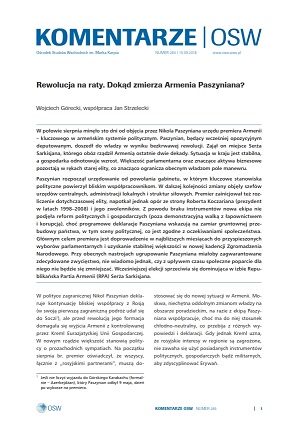Rewolucja na raty. Dokąd zmierza Armenia Paszyniana?
A revolution in instalments. Whither Pashinyan’s Armenia now?
Author(s): Wojciech Górecki, Jan Strzelecki
Subject(s): Civil Society, Government/Political systems, Politics and society, Social development, Sociology of Politics
Published by: OSW Ośrodek Studiów Wschodnich im. Marka Karpia
Keywords: Revolution; Armenia; politics; government; Armenian political system; Prime Minister Nikol Pashinyan; reforms;
Summary/Abstract: In mid-August, a hundred days passed since Nikol Pashinyan took office as Armenia’s Prime Minister, which is an office of key importance for the Armenian political system. Formerly an opposition MP, Pashinyan rose to power as a result of a bloodless revolution. He replaced Serzh Sargsyan, whose camp had ruled Armenia for the last two decades. The country’s domestic situation is stable and its economy is growing. However, the parliamentary majority and significant business assets remain in the hands of the old elite, which considerably reduces the present leadership’s room for manoeuvre. || Pashinyan started his work by forming a government in which key political posts were taken by his close collaborators. Next, he appointed new heads of central-level offices, local administration institutions and law enforcement agencies. The prime minister also initiated the process of settling accounts with the old elite, although this has met with resistance on the part of Robert Kocharyan (Armenia’s president in 1998–2008) and his supporters. Due to the absence of the relevant legal instruments, the new government has failed to launch political and economic reforms (aside from its ostentatious fight against bribery and corruption), even though in his political promises Pashinyan mentioned his intention to thoroughly reconstruct the state, including the political scene, which is in line with what the public expects him to do. The prime minister’s main goal is to organise early parliamentary elections in the upcoming months and to win a stable majority in the new term of the National Assembly. In the present public mood, Pashinyan’s group could win by a landslide. However, it is not known whether its approval rating will remain stable in time. The plan to hold early elections is opposed by the Republican Party of Armenia (RPA) led by Serzh Sargsyan, which holds the largest number of seats in parliament.
Series: OSW Commentary
- Page Count: 8
- Publication Year: 2018
- Language: Polish
- Content File-PDF

